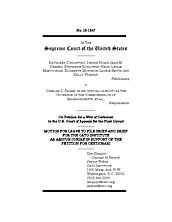Learn more about Cato’s Amicus Briefs Program.
Imagine that you run a daycare business out of your home. Some of your clients are poor families whom your state has decided to help with daycare. The state program allows such families to choose any daycare they want and then reimburses the provider up to a certain amount. Now the state has declared that because of this program, you — and even people who provide at-home daycare for family members’ children — will be considered a state employee for the sole purpose of giving a union exclusive representation rights. You don’t get state medical or dental insurance. You don’t get state retirement benefits. You don’t get paid vacation on national holidays. The only thing you get is a union you didn’t choose and you refuse to join that is now representing your “interests” before the state, which isn’t even your employer. Does this sound far-fetched? Yet it’s what’s happened to Kathleen D’Agostino and seven other women in Massachusetts who are asking the Supreme Court to take their case after the lower courts dismissed their lawsuit. The plaintiffs argue that the state’s imposition of an exclusive representative on them violates their First Amendment freedom of association. In the 2014 case Harris v. Quinn, the Supreme Court ruled that states that unionize healthcare aides and other home-based workers who are “not full-fledged public employees” cannot require those who do not wish to join the union to pay fees to support it. This new case asks the question Harris left unanswered: May a state even mandate an exclusive representative for those who are “not full-fledged public employees”? The U.S. Court of Appeals for the First Circuit said that the case is easily resolved under Abood v. Detroit Board of Education (1977) — which allowed the imposition of “agency fees” on union nonmembers — and does not require further First scrutiny. Abood, however, is like a house built on the sand: it treated the First Amendment concerns public unions (should) raise as already resolved by earlier cases when in fact those earlier cases merely resolved the question of whether the Commerce Clause gave Congress the power to regulate those public unions (the old cases having arisen at a time when the Commerce Clause was only starting to be read expansively). Abood’s reliance on the notion of “labor peace” — which was significant in those old cases but shouldn’t be a valid First Amendment interest — conflicts with the constitutional ban on compelled speech and association absent a substantial government interest. Although the First Circuit treated this case as automatically resolved under Abood, it would actually be a vast expansion of precedent to say that “labor peace” justifies forcibly unionizing at-home workers who are independent except for the sole fact that some of their clients pay them through a government-subsidy program. States are already doing this in a number of fields, but expanding Abood would enable the states to go as far as mandating exclusive representation for private-school teachers whose schools receive funding through state voucher or tax-credit programs. Or apartment-building owners who lease to people in rental-assistance programs. Or for the federal government to impose exclusive representation on bank tellers who work at FDIC-backed institutions. Where does it stop? Cato has filed a brief asking the Supreme Court to answer that question.
